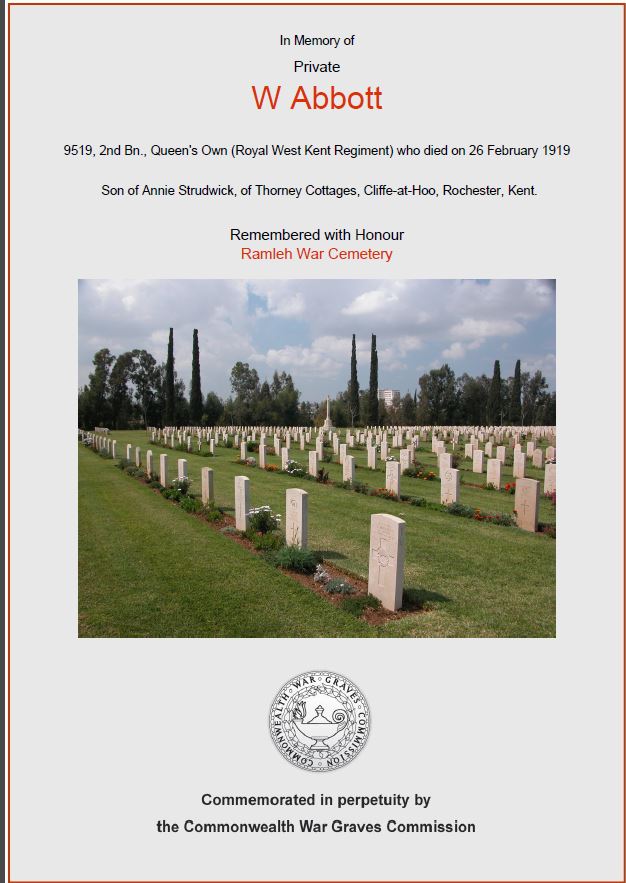William Abbott
1894 – 26th February 1919
William’s parents were Annie Elizabeth Alderton and Nicholas William Abbott who were married in Hampshire in 1890 and they had three children: William, Annie and Nellie.
Sometime after 1891 William’s father was longer on the scene and his mother, Annie, was employed as a housekeeper to Mr Henry Frederick Strudwick, a manager of explosives, residing in Mucking, Essex with her three children.
In 1911 Henry Strudwick was living at 2, Thorney Cottages in Cliffe and was employed Explosive Manufacturing Foreman at the Curtis & Harvey Explosives Works on the Cliffe Marshes. Annie’s youngest child, Nellie, is listed as being Henry’s adopted daughter. At this time William’s mother, Annie, was still being referred to as Annie Elizabeth Abbott and staying with friends.
Sometime between 1911 and 1919 Henry and Annie appear to be married as Annie is referred to as Annie Strudwick, the mother of William Abbott.
William Abbott decided to enlist in the army in 1910 and joined the Queen’s Own (Royal West Kent Regiment) at the age of 18.
Not much is known of William’s war but his regiment’s actions are listed below.
- · 04.08.1914 Stationed at Multan at the outbreak of war.
- · 30.01.1915 Embarked for Mesopotamia from Bombay arriving at Basra to join the 12th Indian Brigade.
- · Nov 1915 Two companies were attached to the 30th Brigade of the 6th Indian Division which was besieged at Kut al Amara and then captured in 29.04.1915.
- · Jan 1916 The remaining companies transferred to the 34th Brigade o f the 15th Indian Division which engaged in various actions against the Turkish forces including;
- · Action of As Sahilan, Capture of Ramadi
- · Aug 1917 the 34th Brigade transferred to the 17th Indian Division which engaged in various actions against the Turkish forces including;
- · The Action at Fat-ha Gorge, The Battle of Sharqat.
- · 31.10.1918 Ended the war in Mesopotamia, Fattah Gorge on Tirgis north of Tikrit.
What actually happened to William is uncertain but it is possible that he may have been one of the captured during the siege of Kut al Amara where the British prisoners suffered brutal treatment. See The National Archives page:
What is known is that William died on 26th February 1919 and is buried with honour at the Ramleh War Cemetery, Israel & Palaestine.

